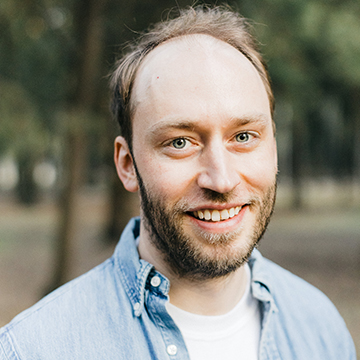Welcome Wilton Snead, PhD

Wilton Snead, PhD
Assistant Professor of Cell & Developmental Biology
Bio
Wilton grew up in Breckenridge, Colorado, a small ski town in the Rocky Mountains. He obtained his BS in bioengineering from the University of Pittsburgh and his PhD in biomedical engineering from the University of Texas at Austin. As a PhD student with Jeanne Stachowiak, Wilton developed biochemical and microscopy-based tools to study protein-membrane interactions. Using these methods, Wilton discovered two mechanisms of cellular membrane remodeling during endocytosis. He was awarded an NIH F31 fellowship for his PhD work. Following his PhD, Wilton moved to the University of North Carolina at Chapel Hill, and later Duke University, to perform postdoctoral work with Amy Gladfelter. As a postdoc and NIH F32 fellow, he combined his interests in membrane biophysics and quantitative microscopy to the still-emerging study of biological phase transitions. He discovered that biological "surfaces" in the cell, including two-dimensional membranes and one-dimensional nucleic acid polymers, act as organizing platforms that control when and where biomolecular condensates assemble. In particular, Wilton found that attachment to cellular membranes can alter the assembly and properties of RNA-protein condensates. He later uncovered how a long noncoding RNA surface controls protein binding and condensation in the nucleus. For his postdoctoral work, Wilton was awarded an NIH K99/R00 Pathway to Independence Award from NIGMS to investigate the cellular mechanisms that govern biomolecular condensation.
Wilton is a dedicated mentor with a commitment to fostering a supportive and inclusive environment for all trainees. He has worked with undergraduate and graduate students throughout his PhD and postdoc, and mentored students through challenging summer research courses at the Marine Biological Laboratory in Woods Hole, MA. His mentees have transitioned to successful positions in academia, medicine, and industry.
Outside the lab, Wilton enjoys playing violin (both classical and fiddle), lap swimming, mountain biking, skiing (at least when back in Colorado), reading, and spending time with his family.
The Snead lab, located on the 8th floor of the Simpson Querrey Biomedical Research Center, opened May 1, 2025.
Research Focus
All cells rely on the precise subcellular organization of biochemistry in time and space. While the classical organelles of the cell utilize bilayer membranes to separate compartments from their surroundings, a relatively new class of subcellular compartments called biomolecular condensates do not possess delimiting membranes. Instead, condensates are composed of concentrated collections of interacting proteins and nucleic acids. Condensates are dynamic and transient, forming/dissolving in response to a variety of stimuli, freely exchanging components with their surroundings, and displaying properties of liquid-like droplets. Biomolecular condensates are involved in an incredible diversity of physiological functions, ranging from intracellular signaling and stress response to transcription and splicing. Genetic mutations and other perturbations that modify condensate properties are closely linked to a variety of human diseases, including cancer and neurodegeneration.
Many different kinds of condensates, each with distinct biochemical compositions and biological functions, coexist at the same time in the cytoplasm and nucleus. It is unclear how collections of biomolecules interact in specific ways to assemble condensates with distinct identities and functions. Moreover, the mechanisms by which functionally-distinct condensates resist mixing or merging with each other are largely unknown.
Although most condensates in cells are complex mixtures of proteins and RNAs, condensate research tends to focus primarily on the roles of proteins. By comparison, RNA is relatively under-studied, and the contributions of RNA to condensate form and function remain largely mysterious. Conversely, the functions of condensates in controlling key stages of the RNA lifecycle in cells, including transcription, splicing, nuclear export, and localization, are poorly understood.
During his postdoc, Wilton developed approaches to reconstitute and visualize biomolecular condensate assembly from minimal mixtures of proteins and RNAs. He discovered that recruitment to membrane surfaces dramatically alters the assembly dynamics and emergent properties of protein-RNA condensates. He later uncovered the sequence and structural grammar of a long noncoding RNA that orchestrates the assembly of nuclear condensates called paraspeckles.
The Snead Lab will continue to leverage their expertise in biophysics, RNA biology, biochemical reconstitution, and quantitative microscopy to study how RNA controls biomolecular condensation and, in turn, how condensates regulate the RNA lifecycle. The lab is particularly interested in understanding how condensates control mRNA export from the nucleus and transport in the cytoplasm. Toward these goals, the Snead Lab is developing a suite of tools to visualize and track condensate assembly and RNA dynamics in living cells. They aim to utilize their discoveries to identify therapeutic approaches that target disease-associated condensates in cancer and neurodegeneration.
Join Our Lab
Our research encompasses the fields of biophysics, cell and molecular biology, biochemistry, and quantitative fluorescence microscopy. The lab is actively recruiting trainees at all levels, including undergraduate and graduate students, postdocs, and research technicians. Please see below for details on applying to join the group:
Postdoctoral Fellows
Graduate Students
We welcome graduate students from different programs at Northwestern University including the DGP. Please contact Wilton with your CV and a brief description of your research interests. We will begin accepting rotation students in early fall 2025.
Undergraduate Students
We welcome undergraduate students interested in gaining research experience. Please contact Wilton with a description of your education and relevant work experience.
Research Technicians
Our available positions for research technicians will be advertised on the Northwestern Human Resources Careers website.